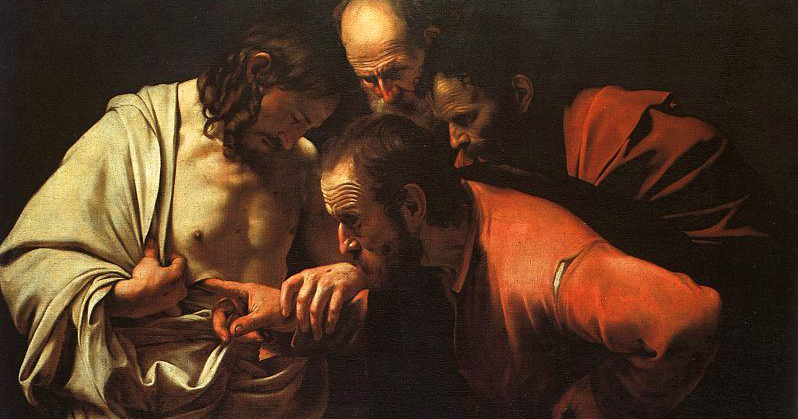Jesus was not just a teacher to the Apostles. He was not just a really cool guy. He was more. Jesus is God and God is love. Imagine spending three years in the presence of Love incarnate. There was an intimacy in the relationship that the Apostles had with Jesus. There must have been many conversations about ordinary life. Love lived with the Apostles. That is why, in John 11, when Jesus declares His intent to return to Judah to visit Martha, Mary and restore Lazarus, the Apostles all oppose Him. They know that there are people in Judah who would like to stone Jesus to death. To go to Judah would mean to go to a likely death. After all arguments fail, Thomas, who was called the twin, speaks up, “Let us go die with Him.”
Do you see how much Thomas loved Jesus? If Jesus was going to die, then Thomas wanted to die with Him! That was Thomas’ heart and it was his resolve. It is perhaps Thomas’ finest moment in the Gospels.
We know that Jesus is later brutally murdered. I do not think we can fully grasp the impact that would have had on Thomas and the other Apostles. We know the whole story. We know that He rose from the dead, but they did not know that was coming. The Apostles lived through the horror of Jesus’ passion and death with no knowledge of what God had in store. For a moment consider the brutality and finality of Jesus’ cross. Thomas, as we saw in Chapter 11, put all his hope in Jesus. He knew Jesus was the Messiah. He, like the rest of the Apostles, gave up everything to follow, and then Jesus died in such a terrible and unimaginable way. In that moment, I do wonder if perhaps Thomas wished that he could have lived up to his words in Chapter 11, and died with Jesus.
In John 20:24-29, we find Thomas completely crushed with a heart totally broken. When he returns to his brother Apostles and they are so full of joy, claiming that Jesus is alive, I imagine that Thomas was taken back. He knew that Jesus had died. Hope literally died. How can you believe when hope is dead? To accept the words of his brothers meant to risk losing the Lord all over again. Thomas could not do that, and so in John 20:25 he utters the words we most closely associate with him, “Unless I see the mark of the nails in his hands and put my finger into the nailmarks and put my hand into his side, I will not believe.” Thomas was hurt, and he was not willing to risk being hurt again. His heart had become hardened against the possibility of further injury.
Am I a Doubting Thomas?
The truth is that too often many of us act exactly like Thomas. We say we are willing to die with Christ. We want to believe. We want to live in the abundance of the resurrection, but due to our past wounds, we are unable to be vulnerable. We are unable to put our faith totally in the Lord. Instead of diving headfirst into God’s waiting embrace, we walk tentatively, looking for the other shoe to drop, waiting for it all to fall apart. Hurt by people or past circumstances, our hearts have become hardened and we are unwilling to risk the possibility of being hurt by God. The cruel reality is that the fear of being hurt leaves us hurting. The fear that the cure won’t work, stops us from being healed.
Thomas’ story tells us that God is not willing to leave us in our fear and pain. Eight days later the risen Lord steps into his reality. It was not instant. It must have seemed an eternity to Thomas, but perhaps it was the time he needed for his heart to soften. The same is true for our story. God does not want us to remain in our fear forever. He wants to come into our life and offer Himself to us, but He will come when we are ready. Through the sacraments, we too are invited to physically come into the presence of the Lord. We pray that God will soften our defenses so that He can reveal Himself to us and come more fully into our lives.
Thomas spent three years growing in love for Jesus, who is Love. How much more can we grow close to Jesus through our whole lives and the grace of the Sacraments?






This was much needed today, and so beautifully expressed. Thank you.
I think that Jesus wants us to use our wounds to help others. That means embracing even our doubt as a means to participate in Jesus victory over death. We recognize him in the breaking of the bread and the breaking g of hearts.